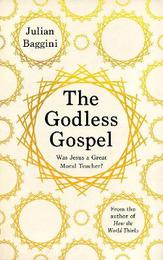
|
The Godless Gospel: Was Jesus A Great Moral Teacher?
Paperback / softback
Main Details
| Title |
The Godless Gospel: Was Jesus A Great Moral Teacher?
|
| Authors and Contributors |
By (author) Julian Baggini
|
| Physical Properties |
| Format:Paperback / softback | | Pages:272 | | Dimensions(mm): Height 216,Width 135 |
|
| Category/Genre | Prose - non-fiction
Popular philosophy |
|---|
| ISBN/Barcode |
9781783786695
|
| Classifications | Dewey:232.903 |
|---|
| Audience | |
|---|
|
Publishing Details |
| Publisher |
Granta Books
|
| Imprint |
Granta Books
|
| Publication Date |
1 October 2020 |
| Publication Country |
United Kingdom
|
Description
Even if we don't believe that Jesus was the son of God, we tend to think he was a great moral teacher. But was he? And how closely do idealised values such as our love of the family, helping the needy, and the importance of kindness, match Jesus's original tenets? Julian Baggini challenges our assumptions about Christian values - and about Jesus - by focusing on Jesus's teachings in the Gospels, stripping away the religious elements such as the accounts of miracles or the resurrection of Christ. Reading closely this new 'godless' Gospel, included as an appendix, Baggini asks how we should understand Jesus's attitude to the renunciation of the self, to politics, or to sexuality, as expressed in Jesus's often elusive words. An atheist from a Catholic background, Baggini introduces us to a more radical Jesus than popular culture depicts. And as he journeys deeper into Jesus's worldview, and grapples with Jesus's sometimes contradictory messages, against his scepticism he finds that Jesus's words amount to a purposeful and powerful philosophy, which has much to teach us today.
Author Biography
Julian Baggini's books include the Sunday Times bestselling How the World Thinks: A Global History of Philosophy, Freedom Regained, The Virtues of the Table, The Ego Trick Welcome to Everytown, What's It All About? and the bestselling The Pig that Wants to be Eaten, all published by Granta Books. He is the Academic Director of the Royal Institute of Philosophy and has written for, among others, the Guardian, the TLS, the Financial Times and Prospect, and for magazines, academic journals and think tanks. His website is microphilosophy.net.
|